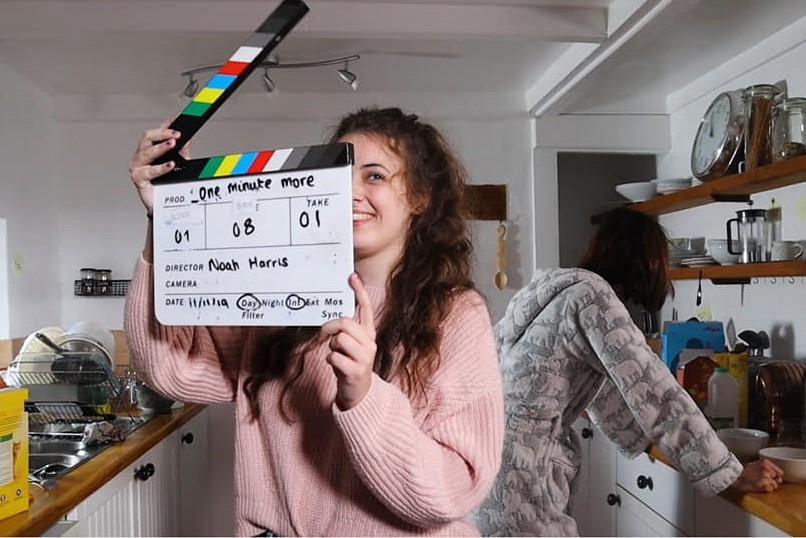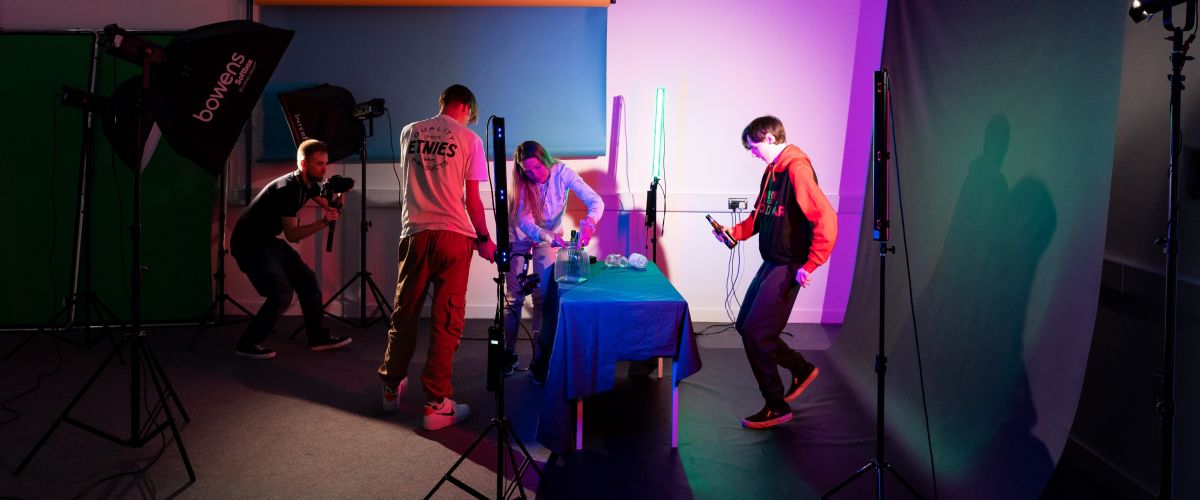A Level Film Studies
Film Studies offers the chance to gain hands-on experience of filmmaking and explore film language, history, theory and criticism. You will study a wide variety of topics including classical Hollywood, contemporary American Independent film, UK and European cinema, film aesthetics, narrative, genre, ideology, contexts and spectatorship.
Key information
Media, Photography & Games / Full Time / A Levels and Equivalent

Why choose this course?
Many consider film to be the main cultural innovation of the 20th century and the major art form of the last 100 years. Those who study it characteristically bring with them a high degree of enthusiasm for what is a powerful and culturally significant medium, inspiring a range of responses from the emotional to the reflective. Film Studies makes an important contribution to the curriculum, offering the opportunity to investigate how film works both as a powerful medium of representation and as an aesthetic medium.
What will I learn?
You will begin by exploring how aspects of film language are motivated for expressive affect. This includes an examination of the creative decisions involved in Mise-en-Scene, Cinematography, Editing, Special Effects and Sound and a consideration of how the structuring concepts of Narrative and Genre control meaning and spectator response. Film contexts are also explored, examining how social, cultural, political, historical and institutional factors shape meaning. You will analyse different films and engage in research involving Hollywood 1930-1990, contemporary American independent film, British film and non-English language European film. In year two you will go on to explore Global filmmaking perspectives including World cinema, Documentary, Silent cinema and Experimental Film.
Production work is a crucial part of the course and is integral to your study of film. Studying a diverse range of films from different contexts is designed to give you the opportunity to apply your knowledge and understanding of how films are constructed to your own filmmaking and screenwriting. This is intended to enable you to create high quality film and screenplay work as well as provide an informed filmmaker's perspective on your own study of film.
Film matters because it has the power to connect us to a world outside of our own, it has an extraordinary capacity to expand our reality, to deepen our moral sensibility, and to shape our self-understandings, sometimes by moving us closer to cultures, problems, and realities that are distant from those we know well. One thing is for sure, after taking the course you will never see a film the same way again.
A2: Component 1: Varieties of film and filmmaking (35% of qualification)
Written examination: 2½ hours
Assesses knowledge and understanding of 6 feature-length films.
Section A: Hollywood 1930-1990 (comparative study)
1 question requiring reference to 2 Hollywood films, 1 from the Classical Hollywood period (1930-1960) and the other from the New Hollywood period (1960-1990).
Section B: American film since 2005 (2 film study)
1 question requiring reference to 2 American films; 1 mainstream film and 1 contemporary independent film.
Section C: British film since 1995 (2 film study)
1 question requiring reference to 2 British films.
A2: Component 2: Global filmmaking perspectives (35% of qualification)
Written examination: 2½ hours
Assesses knowledge and understanding of 5 feature-length films (or their equivalent).
Section A: Global film (two-film study)
1 question requiring reference to 2 global films: 1 European & 1 produced outside Europe.
Section B: Documentary film
1 question requiring reference to 1 documentary film.
Section C: Film movements – Silent cinema
1 question requiring reference to 1 silent film or group of films.
Section D: Film movements – Experimental film (1960-2000)
1 question requiring reference to 1 film option.
A2 Component 3: Production (30% of qualification) Non-exam assessment
Assesses 1 production (20%) and its evaluative analysis (10%):
Either a short film (4-5 minutes) or a screenplay for a short film (1600-1800 words) plus a digitally photographed storyboard of a key section from the screenplay.
An evaluative analysis (1600 - 1800 words)
Assessment Arrangements
Your achievement in this subject is dependent upon excellent attendance, punctuality and effort. You will learn in a friendly atmosphere, using a variety of assessment methods including essay writing, presentations, timed exercises, group & pair work, tests & review meetings.
Information & Support
We encourage all students to read/view widely and conduct their own research into Film, especially those who wish to study Film or Media at degree level. We expect you to actively engage with the online resources such as Sharepoint, eStream, Scoop, It & Twitter as well as relevant course textbooks.
Where will it take me?
A qualification in Film Studies is highly valued by many universities and employers alike. Film Studies is also an excellent subject to complement many courses, such as Media, English, Psychology, Sociology, Photography, Art and Design.
What will I need?
Five GCSEs at grade 4 or above including English Language or Literature at grade 5 or above.
Additional Information
Awarding Body WJEC / EDUQAS
Other courses of interest:
A Level Media Studies
A Level Photography
To obtain more information about this course, please call: 01208 224000 or email enquiry@callywith.ac.uk
